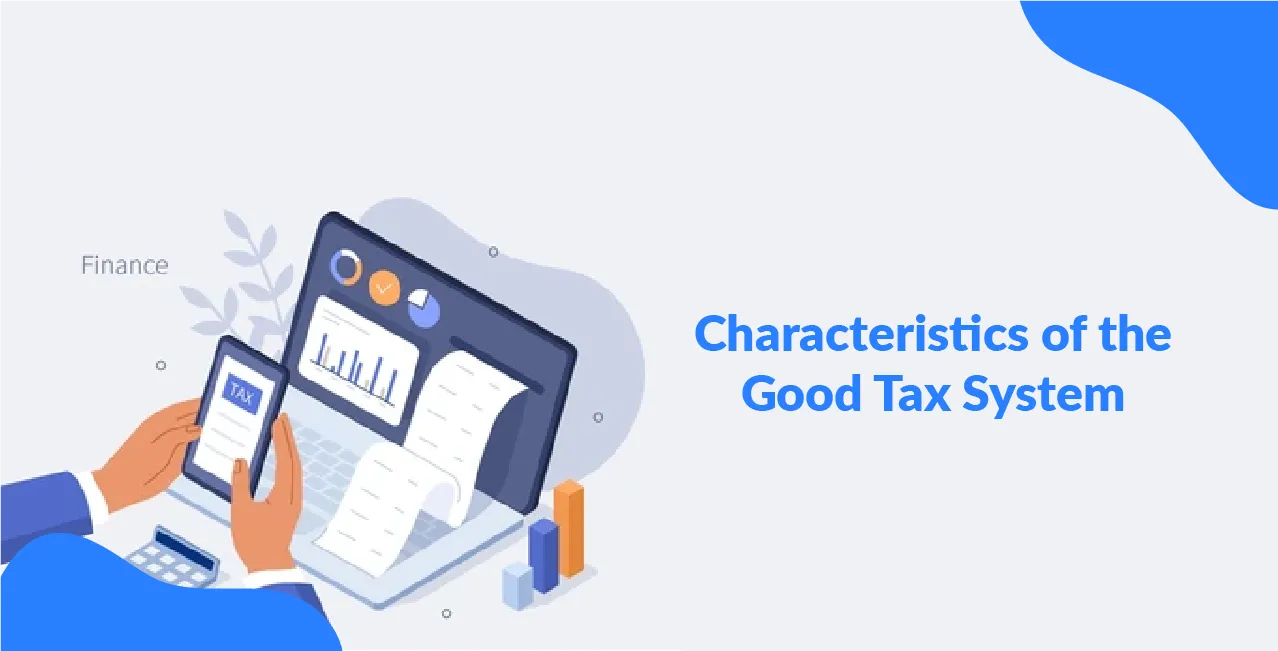Characteristics of the Good Tax System – Key Features Explained

Check Your Loan Eligibility Now
By continuing, you agree to LoansJagat's Credit Report Terms of Use, Terms and Conditions, Privacy Policy, and authorize contact via Call, SMS, Email, or WhatsApp
Akash is getting ₹30,000 a month. His income is taxed by the government to construct roads, schools and hospitals. An excellent tax system guarantees equity, ease of use and effectiveness.
Key Features of a Good Tax System:
A good taxation system leads to quality lives for people, including Akash and retirement of desirable services.
Equity (Fairness) in a Tax System
Akash and Rohan receive a salary of ₹50,000 per month. They both work equally hard, and Akash incurs a tax of ₹5,000, whereas Rohan has special exemptions and only pays ₹2,000 in taxes. It is not fair since they both have the same income but end up with varying taxes.
A fair tax system follows two rules:
- Horizontal Equity
- People with the same income should pay the same tax.
- Example: If Akash and Rohan both earn ₹50,000, they should pay equal taxes.
- Vertical Equity
- Richer people should pay more tax than poorer people.
- Example: If Akash earns ₹1,00,000 and Rohan earns ₹30,000, Akash should pay a higher tax.
Example in a Table:
Key Points:
- Fairness means equal treatment for equal earners.
- Higher earners should contribute more.
- Tax rules should not favour some over others unfairly.
A good tax regime will make sure that both Akash and Rohan will pay equal amounts, and since Priya earns more, she will pay more. This makes taxes fair to all people.
Promotion of Economic Growth Through a Good Tax System
Akash is a small baker. Small companies had their taxes cut by the government last year. The additional finance was used by Akash to purchase a new oven and add a new worker. His bakery now creates more bread, and more profit and contributes to the development of the local economy.
Read More – Section 11 of the Income Tax Act – Exemption for Charitable Trusts
An effective tax system promotes economic growth by making it less challenging to produce, employ new workers and grow those businesses, people such as Akash.
How Taxes Affect Growth
- Encourages Work & Investment
- Lower taxes mean people keep more of their earnings, so they work harder and invest more.
- Example: If Akash pays less tax, he can save money to open a second shop.
- Supports Businesses
- Lower business taxes help companies grow, hire more workers, and produce more goods.
- Example: If taxes on flour and sugar are reduced, Akash’s costs go down, and he can sell bread at lower prices.
- Attracts Foreign Companies
- If a country has fair tax rates, big companies from other countries may set up offices there, creating jobs.
- Example: If taxes for foreign bakeries are low, a big bakery chain might open in Akash’s town, bringing more jobs.
- Rewards Innovation
- Tax breaks for research and new ideas help businesses invent better products.
- Example: If Akash gets a tax discount for using eco-friendly packaging, he might switch to greener materials.
Example in a Table
Key Points:
- Lower taxes help businesses grow.
- Fair taxes encourage new jobs and investments.
- High or unfair taxes can slow down the economy.
A clever taxation strategy cements the success of the bakery Akash owns, which translates to more employment opportunities, quality products and a healthier economy for all.
Conclusion
A good tax system should help everyone, just like it helps Akash and his bakery. When taxes are fair, Akash doesn’t need to struggle to pay his share. If the tax system supports growth, he can grow his business and hire more people.
Clear tax laws save Akash time because he doesn’t have to deal with confusing paperwork. A transparent system also helps him see how the government uses his tax money to build roads and schools. If Akash faces hard times, a flexible tax system can support him and help him get back on his feet.
Also Read - Smart Tax-Saving Strategies for Salaried Individuals
Most importantly, good taxes reward hard work instead of punishing it. When Akash does well, he creates jobs, improves his products, and boosts the local economy. A fair and simple tax system not only helps run the government, but also helps people like Akash build a better future. That’s why fair, easy, and growth-friendly taxes matter to everyone.
Top 10 FAQs About Taxes (Simple Answers)
1. Why do we pay taxes?
Taxes help the government pay for important things everyone uses—like roads, schools, hospitals, and police. Without taxes, these services wouldn’t exist.
2. How is my tax money used?
Your taxes fund public services—fixing streets, paying teachers, running hospitals, and supporting the poor. The government budgets this money for different needs.
3. What happens if I don’t pay taxes?
If you don’t pay, the government can charge fines or take legal action. Paying taxes is a legal duty, like following traffic rules.
4. Why do rich people pay more taxes?
Because they earn more, they can afford to contribute more. This helps balance society, so the poor aren’t overburdened while the rich support public services.
5. Can taxes ever be reduced?
Yes! Governments sometimes cut taxes to help people save money or boost businesses. But if taxes go too low, services like schools and hospitals may suffer.
6. What’s the difference between income tax and GST?
Income tax is taken from your salary, while GST is added to things you buy (like food or clothes). Both go to the government but in different ways.
7. Are small businesses taxed the same as big companies?
No, small businesses often pay lower taxes to help them grow. Big companies pay more because they earn higher profits.
8. Why are some things tax-free?
Essential items (like medicine or basic food) are sometimes tax-free, so poor people can afford them. Luxury items (like cars) usually have higher taxes.
9. Who decides tax rates?
The government sets tax rates based on the country’s needs. They try to balance funding services without making life too hard for taxpayers.
10. Can I get my taxes back?
Sometimes! If you paid extra tax by mistake or qualify for refunds (like education or health benefits), the government may return some money.
Other Related Pages | |||
About the author

LoansJagat Team
Contributor‘Simplify Finance for Everyone.’ This is the common goal of our team, as we try to explain any topic with relatable examples. From personal to business finance, managing EMIs to becoming debt-free, we do extensive research on each and every parameter, so you don’t have to. Scroll up and have a look at what 15+ years of experience in the BFSI sector looks like.
Subscribe Now
Related Blog Post
Recent Blogs
All Topics
Contents
Quick Apply Loan
Consolidate your debts into one easy EMI.
Takes less than 2 minutes. No paperwork.
10 Lakhs+
Trusted Customers
2000 Cr+
Loans Disbursed
4.7/5
Google Reviews
20+
Banks & NBFCs Offers
Other services mentioned in this article








